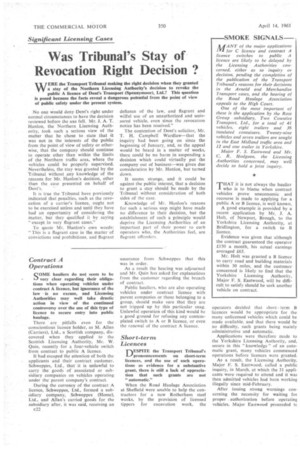Was Tribunal's Stay of Revocation Right Decision ?
Page 62

If you've noticed an error in this article please click here to report it so we can fix it.
WERE the Transport Tribunal making the right decision when they granted a stay of the Northern Licensing Authority's decision to revoke the public A licence of Dent's Transport (Spennymoor), Ltd.? This question is posed because the facts reveal a dangerous potential from the point of view of public safety under the present system.
No one would deny Dent's right under normal circumstances to have the decision reviewed before the axe fell. Mr. I. A. T. Hanlon, the Northern Licensing Authority, took such a serious view of the matter that he chose to state that it was not in the interests of the public from the point of view of safety or otherwise, that the company should continue to operate other than within the limits of the Northern traffic area, where the vehicles could be property supervised. Nevertheless, the stay was granted by the Tribunal without .any knowledge of the reasons for Mr. Hanlon's decision, other than the case presented on behalf of Dent's.
It is true the Tribunal have previously indicated that penalties, such as the revocation of a carrier's licence, ought not to be exercised unless and until they have had an opportunity of considering the matter, but they qualified it by saying "except in very flagrant cases."
To quote Mr. Hanlon's own words: "This is a flagrant case in the matter of convictions and prohibitions, and flagrant defiance of the law, and flagrant and wilful use of an unauthorized and uninsured vehicle, even since the revocation notice has been received."
The contention of Dent's solicitor, Mr. T. H. Campbell Wardlaw—that the inquiry had been going on since the beginning of January, and, as the appeal would be heard in a matter of weeks, there could be no harm in suspending a decision which could virtually put the company out of business—was given due consideration by Mr. Hanlon, but turned down.
It seems strange, and it could be against the public interest, that a decision to grant a stay should be made by the Tribunal without consideration of both sides of the case.
Knowledge of Mr. Hanlon's reasons for such a serious step might have made no difference to their decision, but the establishment of such a principle would deprive the Licensing Authorities of an important part of their power to curb operators who, the Authorities feel, are flagrant offenders.
































































































































